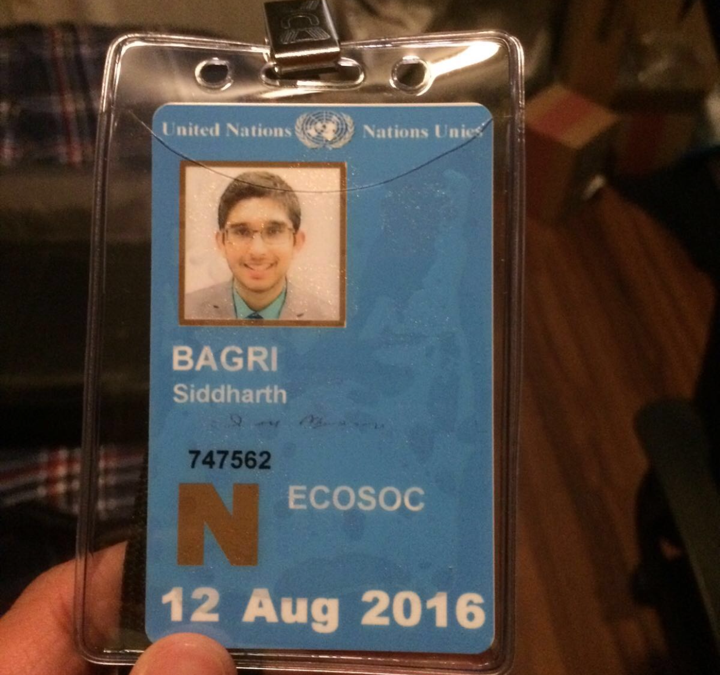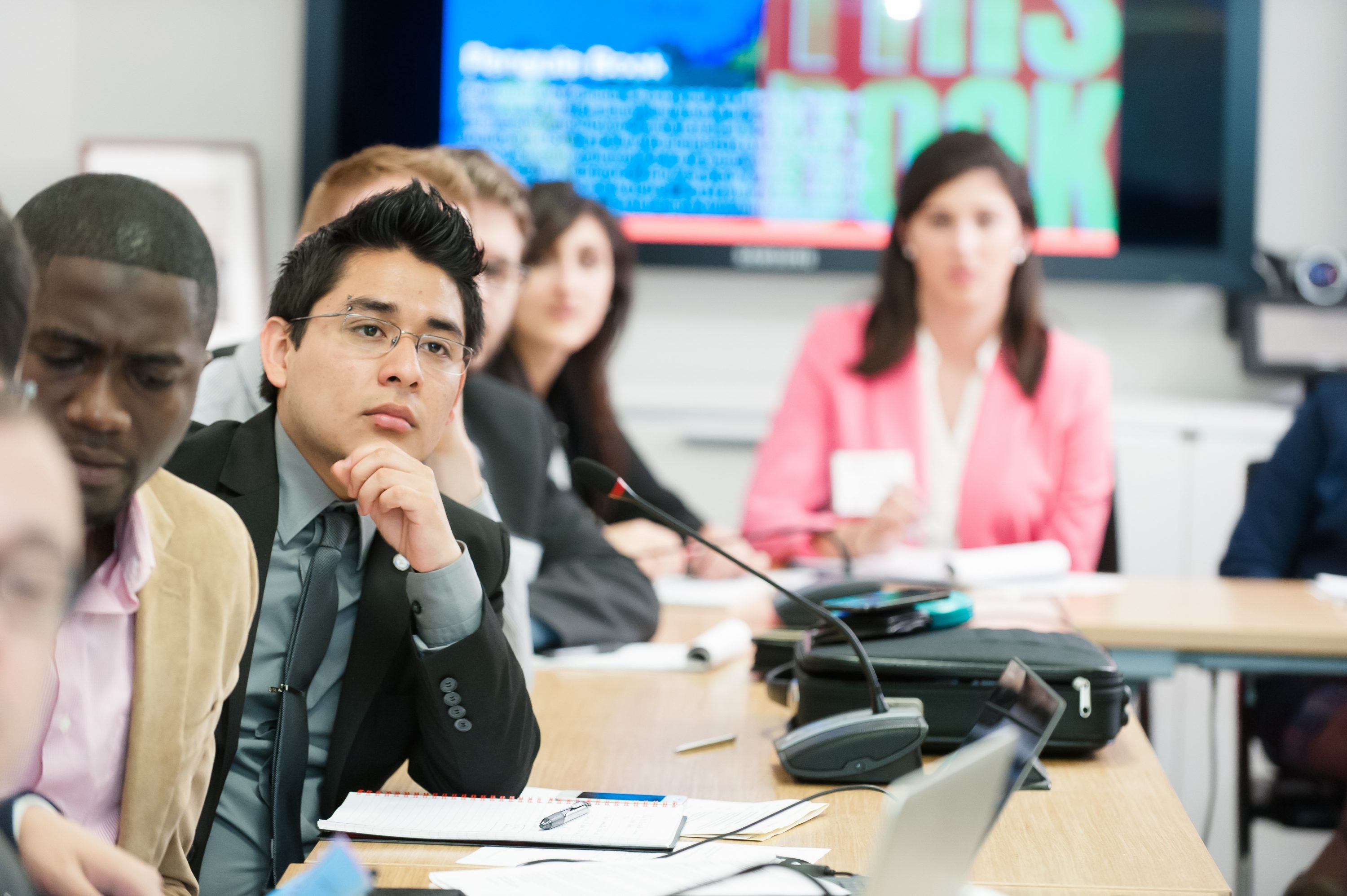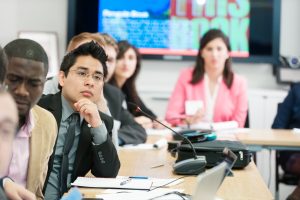
by Catherine Ruby | Aug 23, 2016 | Internship Experiences, Undergraduate Students
Working with Caritas Internationalis’ UN delegation with Mr. Joseph Donnelly gave me a close look inside the UN and on how NGO’s interact with the UN. Caritas is one of the world’s largest humanitarian organizations and much of my work involved researching and relaying information to my supervisor in order to help with his advocacy work. There was a focus on the current volatile situations in the 5 year old newest country, South Sudan, and the border regions of the country of Sudan itself. Sudanese forces have indiscriminately bombed civilians to the point where they have to retreat into caves in order to save themselves. Caritas is trying to provide aid to the people there but the government has also shown itself to be willing to bomb hospitals.
Caritas hosted the visit of a Sudanese Catholic bishop to advocate with UN agencies, Member States and NGOs about the sustained violence, intense human security and injustices taking place in South Kordofan, Nuba Mountains and Blue Nile regions. I scheduled meetings for the bishop. It was interesting to see how meetings are usually arranged in the UN system and I was surprised to learn how last minute some of them ended up being.
Organization is a key skill that I refined during this internship and I also sharpened my research skills. Towards the end of my internship I was asked to shift my focus to Latin America and the events going on there. I researched the current status of the historic peace process in Colombia between the government and the FARC after 50 years of fighting and a 2016 SC resolution/mechanism. This was an interesting experience, especially since I had to make sure that I filtered articles by date and made sure that my sources were reliable. This may sound like a straightforward and basic thing to do, but I realized that any mistakes that I made would have ramifications beyond me. This caused me to pay closer attention to small details.
I also learned to assess diplomatic language to a certain degree. I had the opportunity to attend meetings at the UN such as meetings in the ECOSOC chamber and the Security Council. Being able to hear how diplomats talk when they make speeches helped me navigate through the meanings beyond what was said. I am not exactly proficient at this, but it was a skill I previously did not have, and the more I refined it, the more interesting those meetings became.
My biggest takeaway from this internship would have to be a newfound appreciation for the UN and the various organizations that participate in the system. In the past, I was quite critical of the UN. I never thought that it should not exist, but I did think that the political dimension of it was a dead end that never seemed to work. The humanitarian work that the UN provided was the only thing it seemed to do better than anyone else, but since working at the UN I have come to realize that the UN is not a monolithic entity. Organizations like UNICEF are technically separate from the UN bureaucracy and so is the Security Council.
I realize now that the UN has taken the fall for many mistakes that originated from the member states, and that the UN is only as strong and as effective as the member states want to be. Politics certainly gets in the way of many of the initiatives that the UN tries to undertake, but the UN is still able to function despite the obstacles. I had never really considered the UN as a possible career path, but now that I have completed my internship there, I would not mind searching for a job there.
I would definitely recommend this internship to others. Perhaps they will walk away with a greater appreciation for the UN, as I did.

by Catherine Ruby | May 5, 2016 | Internship Experiences, Undergraduate Students

My name is Jose, I am a junior at the School of Diplomacy with a deep interest in the Latin American region. I intern at The Network for Religious and Traditional Peacemakers (the Network). This organization is led by Antti Pentikainen and funded by the Government of Finland. Its purpose is to work with small communities, and religious and international leaders to promote peace around the globe. I would like to give you an insight of my ongoing journey as an intern and share with you my experiences during the spring 2016 semester.
As an intern, my priority is to keep abreast of the initiatives that the Network has implemented, and collect information used for the Network’s newsletter. Additionally, I am occasionally assigned to cover conferences related to the objectives and core values of the network. Since the Network is an NGO registered with ECOSOC at the United Nations, I have a grounds pass that allows me to have access to open meetings. During the first two weeks of the internship, I attended conferences at the International Peace Institute and at the UN Headquarters. At first, I took notes and briefed Mr. Pentikainen. Then, as I met more members of the Network, I began to learn from them and became comfortable with expressing my ideas. As a result, I volunteered to attend conferences of pertinent topics and submit my own articles for approval by the Network’s secretariat. This was an important step because an intern is widely stereotyped as someone whose responsibility is making copies or getting coffee, someone who is consistently told what to do. Be that as it may, in order to stand out, it is our responsibility to convert from knowledge-consumers to knowledge-producers.
During my hiring interview, Antti Pentikainen, the Network’s Executive director, asked what my dream job or goal was. I said that I would like to be part of the mediation process at the UN, but acknowledged the challenges of dealing with the elites at the global level. For that reason, I would rather focus on a region where my contribution may have a sustainable impact for peace and conflict resolution and not be seen as a quick fix. “If you want to work at the UN, you have to make yourself relevant” said Antti as he offered to facilitate a conversation with experts that could point me in the right direction. On February 15th, the Network’s core members gathered in the NY headquarters to talk about what the current Network’s status was and the direction it was expected to go in. Martine, a member and expert on South Asia, asked me if I thought I was being utilized constructively as an intern. I had been interning for just two weeks, so I did not know how to respond to that. “When I was an intern I brought my boss a proposal of three things I wanted to work with. I recommend you do the same in the area you’re interested in, especially Latin America where the Network’s presence isn’t as strong,” said Martine after my long pause. Although with a different angle, Martine’s advice reiterated what Antti said to me the first day I met him: “make yourself relevant”.
That same day, I talked to Antti and asked for two things: The first is that I wanted to be more involved in the Network’s affairs in Latin America; the second was that I wanted to write short articles about the conferences I attended as long as they were related to the organization’s core values, and hence could potentially be incorporated into the newsletter. I was expecting a long diplomatic, eloquent answer that politely declined my ideas. Instead, I got an “okay” followed by a smile and was Cc’d on an email in which I was recommended to provide assistance to a Network affiliate with a strong presence in Latin America where.
Currently, I am helping with the coordination and logistics for conferences and projects dealing with stability in the Americas and have access to information that isn’t always readily available in mainstream media or simply disregarded because of other issues that dominate the headlines. As for attending conferences and writing my own articles, I will be traveling to Washington DC to cover the gathering of leaders from several religions in the Americas. I am also working with Religions for Peace staff in the preparations of a panel where I will be the moderator.
It has been difficult to balance it with schoolwork, but I enjoy every day I spend at my internship. I was extremely lucky to have met a staff that treats me as if they had known me for years and a humble boss who treats others like family and who is always there to help me. Being an intern at the Network requires a lot of work, time and dedication, but the experience they offer is immeasurable.
For anyone who wants to intern in New York, particularly during the spring semester, I have two recommendations that will help you grow and, perhaps, survive:
First, do not be afraid to offer assistance, ask questions, or be the first one to raise your hand if there is an upcoming project that may be of interest to you, provided you’re able to deliver good results.
Second, after snowstorms, bring your dress shoes and an extra pair of socks in a bag, you may need them.
I hope you enjoyed reading about my journey thus far at the Network as much as I have enjoyed working for them. If there is anyone interested in becoming a part of this team, or if there are any questions, I am more than happy to answer them; working here has given me far more joy than I ever imagined and I’m sure you’d feel the same way.
by Jillian Mcallister | Apr 17, 2013 | Graduate Students, Internship Experiences
Jillian Mcallister is a graduate student interning at the International Rescue Committee (IRC) as a Continuing Education Intern. The IRC responds to humanitarian crises globally and assists refugees who have fled from war-torn countries. Read about her experiences with this organization, and the work that she does.

The major project I have been working on since January, and which gets a little tedious at times, is streamlining searching the City University of New York (CUNY) system to see if they have program that a client is interested in. The CUNY system is comprised of 24 colleges, throughout the 5 boroughs, varying from associate degree community colleges to 4 year colleges. However, some colleges are subject-specific such as the College of Journalism, and many others are Liberal Arts schools. As someone unfamiliar with the system, I discovered there is no easy way to search across all campuses for a program. Thus, I am developing a Master List of colleges by borough and what undergraduate, graduate, and certificate programs they offer. Now that it is just about finished at nearly 40 pages, it is still quite cumbersome once you identify a program in a college with a wide variety of majors, to find the name of the school and subsequently which borough. Thus, I am now trying to streamline this process further.
I have also worked on comparatively smaller projects such as translating important terms for IRC for newly arrived clients, from English to Spanish. I adopted one intake sheet used for tracking college application processes to be used for all clients when we initially meet with them and map out a plan to help them pursue their educational goals. As we often discuss quite a few options in our meetings. I give them a copy of this sheet after each meeting if notes were added in subsequent meetings, to help slow the potential head spinning a day or 2 later. We also plan to use the data on these intake sheets to supplement the monitoring and tracking for our monthly reports on demographics and services provided.
Some of our clients had prior education in their home country that they may not have been able to pursue further or it may have gotten interrupted due to conflict. In such cases, I need to determine if the client has documentation of previous education such as transcripts and/or diploma, and what they equate to here in the US. Some are in the native language and need to be translated and evaluated, some are in English and need to be evaluated as to equivalency in the US. I also advise students on agencies that provide these services. This is quite a new experience for me. I have spent over an hour with a client and on the phone with a variety of agencies because what the client had—a single, original, opened version of her transcript in English—did not meet what they wanted—an official, original, sealed version—and thus would not evaluate it. After an hour I located an agency in Miami who stated the same requirements as the other agencies, but understood what the situation was in the client’s home country, Iraq, and would accept the original as she had it. It took me that long to locate an agency who would work with her, considering I have a list of agencies who provided these services, could explain exactly what the situation was, and am a native speaker of English. I could not imagine having to do it from her position and thus why I was glad to spend that much time on it. At one point I had considered sending her home, telling her I would work on it, and contact her when I had an answer. But at that point we were no further than when her case worker brought her to me, so I felt I couldn’t send her away. She was so thankful for me just calling around to different agencies, and it encouraged me to continue what I was doing.
by Sthelyn Romero | Apr 5, 2013 | Graduate Students, Internship Experiences

One Billion Rising Rally in Time Square, New York, NY
One of the coolest activities I have done so far, was participating in Amnesty International USA’s rally to support the One Billion Rising movement. About 30 of us marched down the streets of Times Square, NYC decked out in AIUSA gear and armed with signs, ready to spark attention to our cause.
We gathered at the center of Times Square, chanting and dancing to stop the violence against women. The rally was led by Thenjiwe McHarris, Senior Campaigner at Amnesty International, who gave a motivating speech that caught the attention of many passer-byes. The purpose of the rally was to promote awareness about the issue of violence against women and inform people about the VAWA (Violence Against Women Act). We hoped that with this rally people would take action, especially on the 10 IAR cases of gender-based violence. This Campaign is a movement that spanned throughout many cities in the US (Washington, D.C, San Francisco, Chicago, and Atlanta) and throughout the globe.
Being a part of this campaign was a unique experience that brought to life the type of grass-root campaigning AIUSA is known for. I was able to learn more about campaigning and organizing during this experience which is valuable in my chosen career path. It was also a chance to be a part of the process to end violence against women and promote equality.
Who can say that they danced around NYC for an hour as part of their internship? I had a great time; but more importantly, as a woman, it was empowering to rise for women’s rights, something I strongly believe in.





